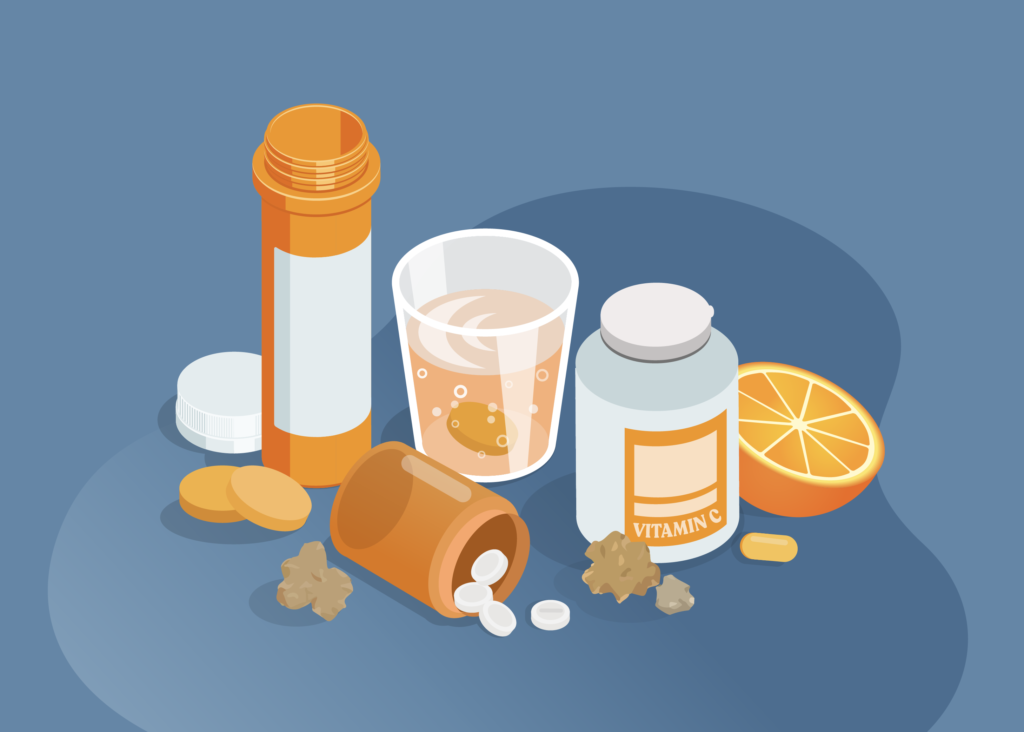Vitamin C is known for its immunity-boosting effects1, but those benefits could come at a cost for kidney stone formers!
What is Vitamin C?
Vitamin C – otherwise known as ascorbic acid – can be naturally found in foods such as citrus fruits, tomatoes, and broccoli. This essential vitamin is necessary for the growth and repair of your body through processes such as wound healing, as well as skin and blood vessel formation.
It is generally recommended that you consume 75-90 mg of Vitamin C per day, though recommendations may vary based on your sex, age and comorbidities. Most of us will consume sufficient Vitamin C through our daily intake of food and beverages2, though some prefer to enhance their intake through Vitamin C supplements.
Does Vitamin C cause kidney stones?
With excessive intake of Vitamin C supplements, it does increase the risk of developing kidney stones!
Supplementary vitamin C intake has been noted as a risk factor for kidney stone formation, as it increases urinary oxalate excretion. Oxalate is a major breakdown product of ascorbic acid, which can combine with calcium to form kidney stones.
A long-term study of over 197,000 men and women revealed that dietary vitamin C (e.g. from orange juice) is not associated with the risk of kidney stones. However, when combined with supplemental vitamin C (e.g. vitamin C capsules), it increased the risk of kidney stones in men. Once total vitamin C intake – both dietary and supplemental, reached 700-800 mg per day, the risk for kidney stone development increased by a statistically significant amount. This can largely be attributed to supplemental vitamin C intake, as very few men in the study had dietary vitamin C intakes exceeding 700 mg/day. It is unclear why it does not affect women in the same way, though it could be due to sex differences in vitamin C metabolism2.
But I heard that oranges and lemons are good for preventing kidney stones?
In addition to vitamin C, citrus fruits contain citric acid, which helps to reduce urine supersaturation and increase your urinary citrate levels. This can be especially helpful for patients with low urinary citrate3.
Thankfully, this does not mean you have to avoid Vitamin C entirely. It is highly unlikely that you will consume more than 700 mg of Vitamin C per day, as a single peeled orange or lemon contains only 53 mg of Vitamin C per 100 grams2!
If you consume Vitamin C supplements, be extra cautious with your daily intake and consult your physician for advice.
Sources:
- Carr, A. C., & Maggini, S. (2017). Vitamin C and immune function. Nutrients, 9(11), 1211.
- Vitamin C Fact Sheet for Consumers (2021). NIH Office of Dietary Supplements. Retrieved from https://ods.od.nih.gov/factsheets/VitaminC-Consumer/
- Gul, Z., & Monga, M. (2014). Medical and dietary therapy for Kidney Stone Prevention. Korean Journal of Urology, 55(12), 775. https://doi.org/10.4111/kju.2014.55.12.775





